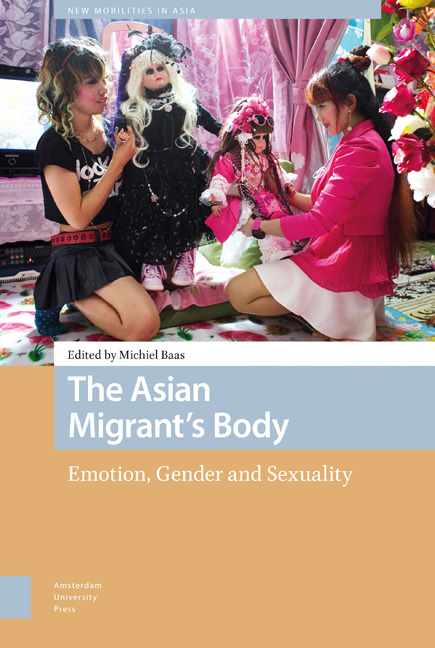Book contents
- Frontmatter
- Contents
- Introduction: Conceptualizing the Asian Migrant’s Body
- 1 ‘Not a Lesbian in Dubai, Not gay in Tehran’: Sexualities, Migrations, and Social Movements across the Gulf
- 2 Bodies at Work: Gendered Performance and Migrant Beer Sellers in Southeast Asia
- 3 Body, Space, and Migrant Ties: Migrant Domestic Workers and Embodied Resistances in Lebanon
- 4 The Day Off Policy , ‘Reverse Domestication’, and Emotional Labour among Indonesian Domestic Workers in Singapore: Maria Platt, Brenda S.A. Yeoh, Khoo Choon Yen, Grace Baey and Theodora Lam
- 5 Embodying the Good Migrant in Ageing: Negotiating Positive Subjectivities Through Paid Work
- 6 Proper Conjugation of Bodies: Chastity, Age, and Care Work in Sri Lankan Migrants’ Families
- 7 Border-crossing as Sexual Subjects: Interracial Dating Experience of Young Chinese in New Zealand
- 8 Managing Touch: The Racialized Dynamics of Intimacy in the Los Angeles Beauty Industry
- Notes on Contributors
- Index
4 - The Day Off Policy , ‘Reverse Domestication’, and Emotional Labour among Indonesian Domestic Workers in Singapore: Maria Platt, Brenda S.A. Yeoh, Khoo Choon Yen, Grace Baey and Theodora Lam
Published online by Cambridge University Press: 23 June 2021
- Frontmatter
- Contents
- Introduction: Conceptualizing the Asian Migrant’s Body
- 1 ‘Not a Lesbian in Dubai, Not gay in Tehran’: Sexualities, Migrations, and Social Movements across the Gulf
- 2 Bodies at Work: Gendered Performance and Migrant Beer Sellers in Southeast Asia
- 3 Body, Space, and Migrant Ties: Migrant Domestic Workers and Embodied Resistances in Lebanon
- 4 The Day Off Policy , ‘Reverse Domestication’, and Emotional Labour among Indonesian Domestic Workers in Singapore: Maria Platt, Brenda S.A. Yeoh, Khoo Choon Yen, Grace Baey and Theodora Lam
- 5 Embodying the Good Migrant in Ageing: Negotiating Positive Subjectivities Through Paid Work
- 6 Proper Conjugation of Bodies: Chastity, Age, and Care Work in Sri Lankan Migrants’ Families
- 7 Border-crossing as Sexual Subjects: Interracial Dating Experience of Young Chinese in New Zealand
- 8 Managing Touch: The Racialized Dynamics of Intimacy in the Los Angeles Beauty Industry
- Notes on Contributors
- Index
Summary
Abstract
This chapter reflects upon Singapore's ‘Day Off’ for domestic workers and how it has disrupted long-held notions of how and when domestic workers should undertake their emotional labour in the households in which they work. Specifically, this chapter examines how domestic workers negotiate the legal possibility of a weekly day off within domestic workplaces underpinned by a high degree of emotional labour. We show how the ‘Day Off’ brings with it the threat of ‘out of place’ bodies, while also speaking more broadly to the pre-existing inequality that exists between employers and employees in Singapore's domestic worker landscape.
Keywords: migrant domestic workers, Singapore, day-off, emotional labour, migrant bodies
Introduction
Domestic work and the embodied emotional labour it entails have been widely documented in the literature (see for example: Parreñas 2000, 2001a; Anderson 2000; Huang and Yeoh 2007). Women as domestic workers were noted as integral to not only nurturing the emotional well-being of their own family of origin, but also in the households of their employers, where they are often considered to become ‘one of the family’ (Parreñas 2001a: 364). As Lan (2003: 536) noted, this notion of ‘familial belonging’ for domestic workers contributes to the idea that their work represents a ‘labour of love’. Reproductive labour, with which domestic workers are so intricately involved, is not only a form of corporeal labour but also invested with emotion, as they care for children and/or the elderly, prepare family meals and pack school bags (Anderson 2000). Domestic workers, who are almost invariably women, must also negotiate their own often complex sets of emotions as they often leave family and communities behind, situate themselves within a foreign household (in every sense of the word) while attempting to forge a livelihood for themselves. In addition, women also have to negotiate the degraded social status that domestic work often entails (Parreñas 2000) as a 3D (dirty, difficult, and dangerous) occupation.
By exploring the emotional subjectivities of Indonesian foreign domestic workers (FDWs), this chapter gives a specific focus on a recent policy development for FDWs residing in the city-state of Singapore. The Day Off policy, as it has become known, provides domestic workers who signed or renewed a work contract after 1 January 2013 the right to a weekly day off, or financial compensation in lieu of time off.
- Type
- Chapter
- Information
- The Asian Migrant's BodyEmotion, Gender and Sexuality, pp. 89 - 108Publisher: Amsterdam University PressPrint publication year: 2020

